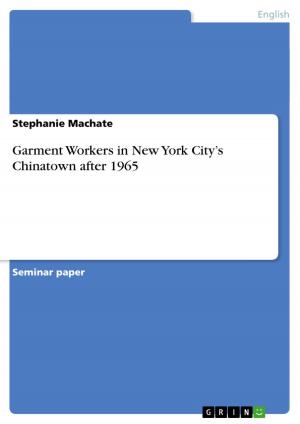Trauma and Postmemory in Art Spiegelman's 'The Complete Maus' and Helen Fremont's 'After Long Silence'
Nonfiction, Entertainment, Drama, Anthologies| Author: | Kinga Gmiat | ISBN: | 9783668185760 |
| Publisher: | GRIN Publishing | Publication: | April 1, 2016 |
| Imprint: | GRIN Publishing | Language: | English |
| Author: | Kinga Gmiat |
| ISBN: | 9783668185760 |
| Publisher: | GRIN Publishing |
| Publication: | April 1, 2016 |
| Imprint: | GRIN Publishing |
| Language: | English |
The Holocaust represents an immense historical as well as a cultural trauma. The following thesis talks about the trauma symptoms and the behavior of Holocaust victims, including a broad selection of scholarly research on the Holocaust aftermath. Afterwards, features of postgeneration art will be presented in detail, as second generation literature and art mirrors the depression and horrid state of the mind of survivors. By analyzing Art Spiegelmann's 'The Complete Maus' and Helen Fremont's 'After Long Silence' this thesis aims at portraying the degree of traumatization as well as the extent to which the second generation is affected by the traumatic experiences of the parents´ lives. Contents: - Symptoms of psychological trauma and behavior, - Recovery and the Necessity of a Story, - Direct and Indirect Trauma, - The Concept of Postmemory: Familial Transmission of Trauma, - The Silence of the First Generation.
The Holocaust represents an immense historical as well as a cultural trauma. The following thesis talks about the trauma symptoms and the behavior of Holocaust victims, including a broad selection of scholarly research on the Holocaust aftermath. Afterwards, features of postgeneration art will be presented in detail, as second generation literature and art mirrors the depression and horrid state of the mind of survivors. By analyzing Art Spiegelmann's 'The Complete Maus' and Helen Fremont's 'After Long Silence' this thesis aims at portraying the degree of traumatization as well as the extent to which the second generation is affected by the traumatic experiences of the parents´ lives. Contents: - Symptoms of psychological trauma and behavior, - Recovery and the Necessity of a Story, - Direct and Indirect Trauma, - The Concept of Postmemory: Familial Transmission of Trauma, - The Silence of the First Generation.















